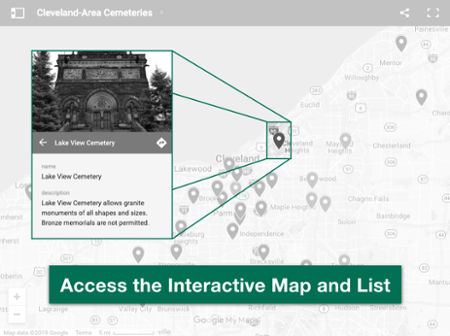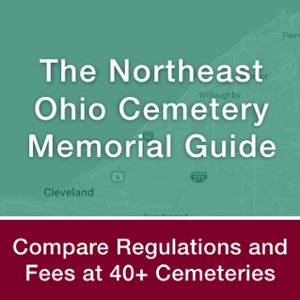Selecting a final resting place for yourself or a loved one is deeply personal. It’s a choice that deserves careful consideration and informed decision-making.
Yet, amidst the emotional whirlwind of loss and practicalities, it's all too easy for important details to slip through the cracks.
Below we delve into cemetery selection and memorialization, highlighting the facts you should know before buying a grave.
1. Don’t Let Someone Else Choose the Grave for You
Selecting a final resting place is a significant decision in one’s life. However, it's surprising how often it gets delegated to others without much thought.
We cannot stress enough the importance of personal agency in this matter. Your final resting place should reflect your wishes, not the result of someone else's convenience or assumption.
When a loved one passes, the immediate focus often turns to funeral arrangements, where the funeral director plays a pivotal role. They may suggest a cemetery, and in the mix of emotions, it's easy to go with their recommendation without fully exploring alternatives.
Without adequate information, families may find themselves facing unexpected costs and a grave that is not cared for or maintained. It's essential to approach this decision with clarity and deliberation, ensuring that your final resting place truly reflects your wishes and values.
>>> Related Resource: Why Location Matters When Choosing a Memorial of Headstone
2. The Cemetery May Not Disclose Fees, Rules and Regulations
Choosing a cemetery involves more than just picking a plot of land—it requires navigating a maze of fees, rules and regulations. Unfortunately, many cemeteries aren't as forthcoming about these crucial details as one might expect. Knowing the type of memorial you’d like could help in understanding how the fees, rules and regulations apply to you.
Read cemetery reviews just like you would with other personal purchases. Understand what the full investment might be and verify what the cemetery offers while comparing what you feel is best for you and your family. One cemetery may charge $10,000 in fees while another across town could be $1,200. Don’t be afraid to advocate for yourself and if you need assistance, your local monument dealer will be happy to help.
When talking with families, our certified memorialists always caution that some cemeteries may not disclose all associated costs and regulations upfront. This lack of transparency can lead to unexpected surprises and financial burdens for grieving families. To avoid such pitfalls, it's essential to ask detailed questions and seek clarity on all aspects before making any commitments.
>>> Related Resource: Why Working With a Memorial Provider Is Cheaper Than a Cemetery
3. Get Started on the First Step
When it comes to designing a personalized headstone, relying solely on cemetery offerings might not yield the desired result. Cemeteries typically lack the specialized expertise needed to create truly customized memorials. Instead, working with a certified memorialist can ensure that your vision for a unique tribute is brought to life.
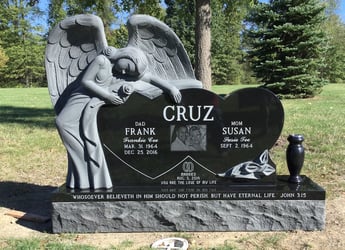
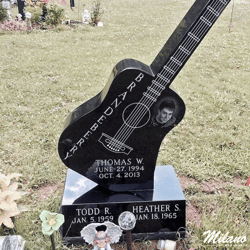
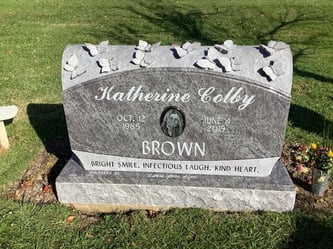
By choosing to work with a certified memorialist, families can rest assured that their loved one's memorial will be more than just a standard-issue grave marker. Each piece becomes a personalized reflection of the departed's personality and legacy, providing comfort and solace to those left behind.
4. You Don’t Have to Have a Grave Purchased Before Designing a Headstone
Contrary to common belief, the process of memorialization doesn't require purchasing a grave before designing a headstone. Our memorial specialists advise focusing on designing a meaningful memorial first, independent of the gravesite. Once the design is finalized, selecting an appropriate gravesite to complement it becomes the next step.
Discussing the purchase of a grave with experienced professionals, such as monument companies, is crucial. These experts offer valuable guidance to ensure informed decision-making about one's final resting place. By gaining insights into cemetery regulations, pricing structures and memorialization options, individuals can navigate the process more effectively, minimizing potential pitfalls.
5. Cemeteries Put in Their Own Foundations—Often Not Deep Enough
A crucial yet often overlooked aspect of cemetery purchases is the foundation installation for headstones. Many cemeteries utilize a 4-inch slab, which likely lacks the stability necessary for common headstones. The proper foundation depth, ideally between 36 to 42 inches, is vital for ensuring the longevity of your memorial.
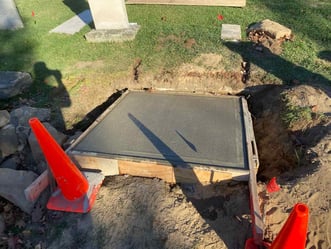
Milano Monuments adheres to a foundation depth of between 36 to 42 inches, ensuring optimal stability for monuments. A solid foundation is paramount for preventing issues such as tilting or sinking over time. It provides better support, especially for larger or heavier memorials, enhancing the durability and integrity of the monument.
It's worth noting that many cemeteries implement minimal foundation practices without informing consumers about what constitutes an adequate foundation depth.
>>> Related Resource: Everything You Need to Know About Purchasing a Memorial Foundation
6. Walk Around a Cemetery to See How It’s Maintained
Before finalizing your decision, we suggest taking a stroll through different cemeteries to evaluate their maintenance standards. Pay close attention to the upkeep of lawns, memorials and overall feeling. A well-maintained cemetery is indicative of a profound commitment to honoring those laid to rest.
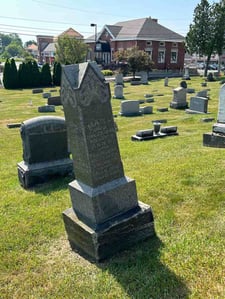
By seeking guidance from seasoned professionals, comprehending cemetery regulations and prioritizing superior craftsmanship, families can craft enduring tributes that honor the memory of their loved ones for generations to come.
Explore Northeast Ohio Cemeteries
Discover the differences between over 40 Cleveland-area cemeteries with our comprehensive guide. Gain insights into memorial regulations, fees and unique features to make an informed grave decision for yourself and your family. Click here to download your copy.



